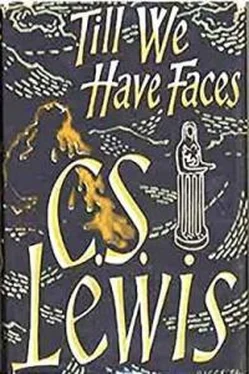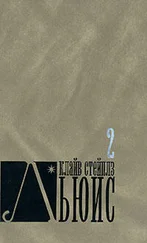It was the calmest day; pure autumn; very hot, yet the sunlight on the stubble looked aged and gentle, not fierce like the summer heats. You would think the year was resting, its work done. And I whispered to myself that I too would begin to rest. When I was back at Glome I would no longer pile task on task. I would let Bardia rest too (I had often thought he began to look tired) and we would let younger heads be busy, while we sat in the sun and talked of our old battles. What more was there for me to do? Why should I not be at peace? I thought this was the wisdom of old age beginning.
The hot spring (like all such rarities) was only food for stupid wonder. When we had seen it we went further down the warm, green valley in which it rose and found a good camping place between a stream and a wood. While my people were busied with the tents and the horses, I went a little way into the wood and sat there in the coolness. Before long I heard the ringing of a temple bell (all temples, nearly, have bells in Essur) from somewhere behind me. Thinking it would be pleasant to walk a little after so many hours on horseback, I rose and went slowly through the trees to find the temple; very idly, not caring whether I found it or not. But in a few minutes I came out into a mossy place free of trees, and there it was; no bigger than a peasant’s hut but built of pure white stone, with fluted pillars in the Greek style. Behind it I could see a small thatched house where, no doubt, the priest lived.
The place itself was quiet enough, but inside the temple there was a far deeper silence and it was very cool. It was clean and empty and there were none of the common temple smells about it, so that I thought it must belong to one of those small, peaceful gods who are content with flowers and fruit for sacrifice. Then I saw it must be a goddess, for there was on the altar the image of a woman, about two feet high, carved in wood; not badly done and all the fairer (to my mind) because there was no painting or gilding but only the natural pale colour of the wood. The thing that marred it was a band or scarf of some black stuff tied round the head of the image so as to hide its face—much like my own veil, but that mine was white.
I thought how much better all this was than the house of Ungit, and how unlike. Then I heard a step behind me and, turning, saw that a man in a black robe had come in. He was an old man with quiet eyes; perhaps a little simple.
“Does the Stranger want to make an offering to the goddess?” he asked.
I slipped a couple of coins into his hand and asked what goddess she was.
“Istra,” he said.
The name is not so uncommon in Glome and the neighbouring lands that I had much cause to be startled; but I said I had never heard of a goddess called that.
“Oh, that is because she is a very young goddess. She has only just begun to be a goddess. For you must know that, like many other gods, she began by being a mortal.”
“And how was she godded?”
“She is so lately godded that she is still a rather poor goddess, Stranger. Yet for one little silver piece I will tell you the sacred story. Thank you, kind Stranger, thank you. Istra will be your friend for this. Now I tell you the sacred story. Once upon a time in a certain land there lived a king and a queen who had three daughters, and the youngest was the most beautiful princess in the whole world….”
And so he went on, as such priests do, all in a singsong voice, and using words which he clearly knew by heart. And to me it was as if the old man’s voice, and the temple, and I myself and my journey, were all things in such a story; for he was telling the very history of our Istra, of Psyche herself—how Talapal (that’s the Essurian Ungit) was jealous of her beauty and made her to be offered to a brute on a mountain, and how Talapal’s son Ialim, the most beautiful of the gods, loved her and took her away to his secret palace. He even knew that Ialim had there visited her only in darkness and had forbidden her to see his face. But he had a childish reason for that: “You see, Stranger, he had to be very secret because of his mother Talapal. She would have been very angry with him if she had known he had married the woman she most hated in the world.”
I thought to myself, “It’s well for me I didn’t hear this story fifteen years ago; yes, or even ten. It would have reawakened all my sleeping miseries. Now, it moves me hardly at all.” Then, suddenly struck afresh with the queerness of the thing, I asked him, “Where did you learn all this?”
He stared at me as if he didn’t well understand such a question. “It’s the sacred story,” he said. I saw that he was rather silly than cunning and that it would be useless to question him. As soon as I was silent he went on.
But now all the dreamlike feeling in me suddenly vanished. I was wide awake and I felt the blood rush into my face. He was telling it wrong; hideously and stupidly wrong. First of all, he made it that both Psyche’s sisters had visited her in the secret palace of the god (to think of Redival going there!) “And so,” he said, “when her two sisters had seen the beautiful palace and been feasted and given gifts, they——”
“They saw the palace?”
“Stranger, you are hindering the sacred story. Of course they saw the palace. They weren’t blind. And then——”
It was as if the gods themselves had first laughed, and then spat, in my face. So this was the shape the story had taken. You may say, the shape the gods had given it. For it must be they who had put it into the old fool’s mind or into the mind of some other dreamer from whom he’d learned it. How could any mortal have known of that palace at all? That much of the truth they had dropped into someone’s mind, in a dream, or an oracle, or however they do such things. That much; and wiped clean out the very meaning, the pith, the central knot, of the whole tale. Do I not do well to write a book against them, telling what they have kept hidden? Never, sitting on my judgement seat, had I caught a false witness in a more cunning half–truth. For if the true story had been like their story, no riddle would have been set me; there would have been no guessing and no guessing wrong. More than that; it’s a story belonging to a different world, a world in which the gods show themselves clearly and don’t torment men with glimpses, nor unveil to one what they hide from another, nor ask you to believe what contradicts your eyes and ears and nose and tongue and fingers. In such a world (is there such? it’s not ours, for certain) I would have walked aright. The gods themselves would have been able to find no fault in me. And now to tell my story as if I had had the very sight they had denied me … is it not as if you told a cripple’s story and never said he was lame, or told how a man betrayed a secret but never said it was after twenty hours of torture? And I saw all in a moment how the false story would grow and spread and be told all over the earth; and I wondered how many of the other sacred stories are just such twisted falsities as this.
“And so,” the priest was saying, “when these two wicked sisters had made their plan to ruin Istra, they brought her the lamp and——”
“But why did she—they—want to separate her from the god, if they had seen the palace?”
“They wanted to destroy her because they had seen her palace.”
“But why?”
“Oh, because they were jealous. Her husband and her house were so much finer than theirs.”
That moment I resolved to write this book. For years now my old quarrel with the gods had slept. I had come into Bardia’s way of thinking; I no longer meddled with them. Often, though I had seen a god myself, I was near to believing that there are no such things. The memory of his voice and face was kept in one of those rooms of my soul that I didn’t lightly unlock. Now, instantly, I knew I was facing them; I with no strength and they with all; I visible to them, they invisible to me; I easily wounded (already so wounded all my life had been but a hiding and staunching of the wound), they invulnerable; I one, they many. In all these years they had only let me run away from them as far as the cat lets the mouse run; now, snatch! and the claw on me again. Well; I could speak. I could set down the truth. What had never perhaps been done in the world before should be done now. The case against them should be written.
Читать дальше











